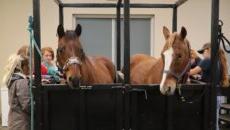
Equine Science Master's Program
A Master of Science degree in Equine Science from Saint Mary-of-the-Woods College will prepare you for a rewarding career in the equine or ag-biotech industries.
Master of Science in Equine Science (MSE)
The Mari Hulman School of Equine Studies at SMWC offers the only Master of Science in Equine Science in the state of Indiana. With a concentration in equine instruction/coaching and equine science, our graduate curriculum combines equine studies with leadership. The program focuses on small class sizes and practical instruction to offer valuable experiences through hands-on learning and emerging industry technology. It also combines equine science, animal science and general agriculture for a well-rounded base of industry knowledge.
This program is designed to be completed in two years or three to five years as a part-time student. It is meant to cultivate problem-solving and critical-thinking skills, in order to foster a commitment to improving the welfare of both horses and their human counterparts. We equip our students with the leadership skills necessary to make a lasting and positive impact on the world of equine endeavors. This program also offers limited assistantships in areas such as equine coaching and farm management.
Concentrations:
- Equine Coaching and Instruction
- Thesis in Equine Science
- Non-Thesis in Equine Science
Admission Requirements
- Baccalaureate degree with official transcripts
- Completed application: apply now
- Letters of recommendation
- Current resume
- Personal career statement
FAQs
What is equine science?
Equine science is an in-depth study of all aspects of horses, including care, nutrition, behavior and management. Studying equine sciences allows for the opportunity to pursue careers in the equine industry by helping gain the necessary knowledge of the many varied horse functions and how they relate to scientific principles.
Why get a master’s degree in equine science?
The horse industry in the US contributes $122 billion annually to the US economy all while employing 1.74 million persons. The Indiana Horse Racing industry is estimated to be $2 billion annually. The strength and growth of the horse industry nationally and within Indiana will provide multiple opportunities for graduates, especially with the majority of equine positions being managerial of some type. Earning this degree will provide you with a competitive edge to securing many of these jobs and the ability to diversify into the growing field of Agri-biotechnical employment opportunities regionally and nationwide.
What can you do with a master’s degree in equine science?
This degree offers a wide variety of paths after graduation. Some students choose to further their education and get accepted into a variety of agricultural, animal science or equine Ph.D. programs. Otherwise, there are plenty of opportunities to join the workforce in an industry that is currently in need of more employees. Check out some of these careers:
- Equine coach/instructor
- Breeding manager
- Farm manager
- Racetrack manager
- Agribusiness manager
- Research specialist
What is the average annual salary of someone with an equine science master’s degree?
As you look at starting salaries, keep in mind that the cost of living and opportunities to move with a career or industry sector should also factor into your decision. There are also many different careers someone with this degree could have, but according to ZipRecruiter.com, the average annual salary for someone in equine management is $115,406 a year.
What support and resources are provided at SMWC?
The Learning Resource Center (LRC) provides exceptional, personalized learning resource services to encourage student success. The LRC offers help with a range of academic support services, including a writing center, tutoring, college success courses and more.
Saint Mary-of-the-Woods College is routinely ranked by US News and World Report among the Best Regional Universities in the Midwest and the Best Value Schools. Our departments are also routinely ranked for their individual degree programs.
See the SMWC Difference:
-
 25 Best Online CollegesBest College Reviews
25 Best Online CollegesBest College Reviews -
 #6 Best Colleges in IndianaIntelligent
#6 Best Colleges in IndianaIntelligent -
 Best Value SchoolsU.S. News & World Report
Best Value SchoolsU.S. News & World Report -


 #6 Best Online Universities and Colleges In IndianaIntelligent
#6 Best Online Universities and Colleges In IndianaIntelligent -

 #3 Accredited Online Colleges in Indiana for International StudentsScholarship Hall
#3 Accredited Online Colleges in Indiana for International StudentsScholarship Hall -






 Least Debt - Regional Universities MidwestU.S. News & World Report
Least Debt - Regional Universities MidwestU.S. News & World Report -






 Economic Diversity - Regional Universities MidwestU.S. News & World Report
Economic Diversity - Regional Universities MidwestU.S. News & World Report -

 #7 The Best Online Colleges in IndianaThe Best Schools
#7 The Best Online Colleges in IndianaThe Best Schools -






 Best Online Bachelor's ProgramsU.S. News & World Report
Best Online Bachelor's ProgramsU.S. News & World Report -

 #8 Best Online Colleges in IndianaOnlineU
#8 Best Online Colleges in IndianaOnlineU -

 Best Colleges in IndianaBest Colleges
Best Colleges in IndianaBest Colleges -
#9 Schools Ranked by Student-Faculty RatioOEDb
-

 Historically Women’s Colleges in the U.S.Great Value Colleges
Historically Women’s Colleges in the U.S.Great Value Colleges -

 #6 Best Online Colleges in IndianaBest Colleges
#6 Best Online Colleges in IndianaBest Colleges -






 Top Performers on Social MobilityU.S. News & World Report
Top Performers on Social MobilityU.S. News & World Report -

 CPN Seal of PreventionCampus Prevention Network
CPN Seal of PreventionCampus Prevention Network -






 Best Regional Universities in the MidwestU.S. News & World Report
Best Regional Universities in the MidwestU.S. News & World Report -
Best Online Colleges & Schools in IndianaStudy.com
-

 Best Online MastersOnline Masters Colleges
Best Online MastersOnline Masters Colleges -


 #2 Best Affordable Catholic Colleges with Online Bachelor’s DegreesAffordable Schools
#2 Best Affordable Catholic Colleges with Online Bachelor’s DegreesAffordable Schools -


 #5 Best Affordable Schools in Indiana for Bachelor’s DegreeAffordable Schools
#5 Best Affordable Schools in Indiana for Bachelor’s DegreeAffordable Schools -
Top College for AffordabilityScholarship360
-

 The 25 Best Online Catholic UniversitiesOnline Course Report
The 25 Best Online Catholic UniversitiesOnline Course Report -

 #10 Best Online CollegesCenter for Online Education
#10 Best Online CollegesCenter for Online Education -

 Designated Military Friendly SchoolMilitary Friendly
Designated Military Friendly SchoolMilitary Friendly -
#8 Top Online Colleges in IndianaOnlineDegrees.com
-
Top Adult Degree ProgramsAbound
-

 #5 Online Colleges in IndianaGreat Value Colleges
#5 Online Colleges in IndianaGreat Value Colleges -

 #7 Best Online Colleges in IndianaAccredited Schools Online
#7 Best Online Colleges in IndianaAccredited Schools Online -

 #2 Best Online Colleges in IndianaValue Colleges
#2 Best Online Colleges in IndianaValue Colleges -


 Easiest AdmissionsIntelligent
Easiest AdmissionsIntelligent





